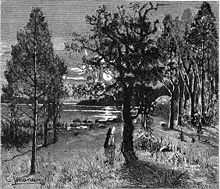Sigrún


Sigrún (Old Norse "victory rune"[1]) is a valkyrie in Norse mythology. Her story is related in Helgakviða Hundingsbana I and Helgakviða Hundingsbana II, in the Poetic Edda. The original editor annotated that she was Sváfa reborn.
The hero Helgi Hundingsbane first meets her when she leads a band of nine Valkyries:
|
|

The two fall in love, and Sigrún tells Helgi that her father Högni has promised her to Höðbroddr, the son of king Granmarr. Helgi invades Granmar's kingdom and slays anyone opposing their relationship. Only Sigrún's brother Dagr is left alive on condition that he swears fealty to Helgi.
Dagr is however obliged by honour to avenge his brothers and after having summoned Odin, the god gives him a spear. In a place called Fjoturlund, Dagr kills Helgi and goes back to his sister to tell her of his deed. Sigrún puts Dagr under a powerful curse after which he is obliged to live on carrion in the woods.
Helgi is put in a barrow, but returns from Valhalla one last time so that the two can spend a night together.
Sigrún died early from the sadness, but was reborn again as a Valkyrie. In the next life, she was Kára and Helgi was Helgi Haddingjaskati, whose story is related in Hrómundar saga Gripssonar.
In popular culture
- Sigrún appears in the The Dresden Files series under the alias "Gard" as a Valkyrie working as a security consultant from Monoc Securities, under contract for "Gentleman" John Marcone. Her true name and nature is revealed in the short story "Heorot".
Notes
- ↑ Orchard (1997:194).
- ↑ Helgakviða Hundingsbana I at «Norrøne Tekster og Kvad», Norway.
- ↑ Bellow's translation.
References
- Orchard, Andy (1997). Dictionary of Norse Myth and Legend. Cassell. ISBN 0-304-34520-2
| |||||||||||||
.png)